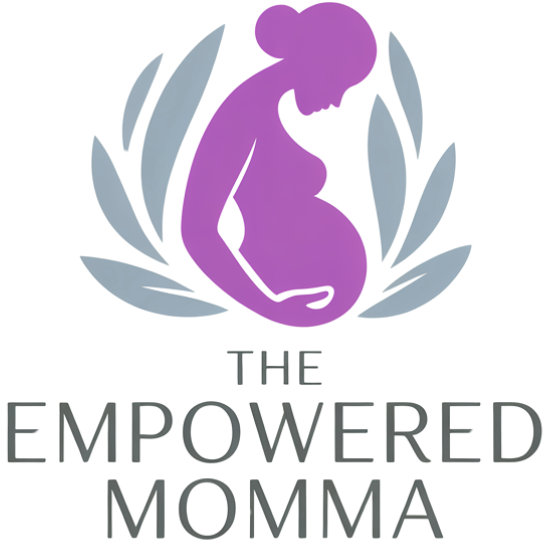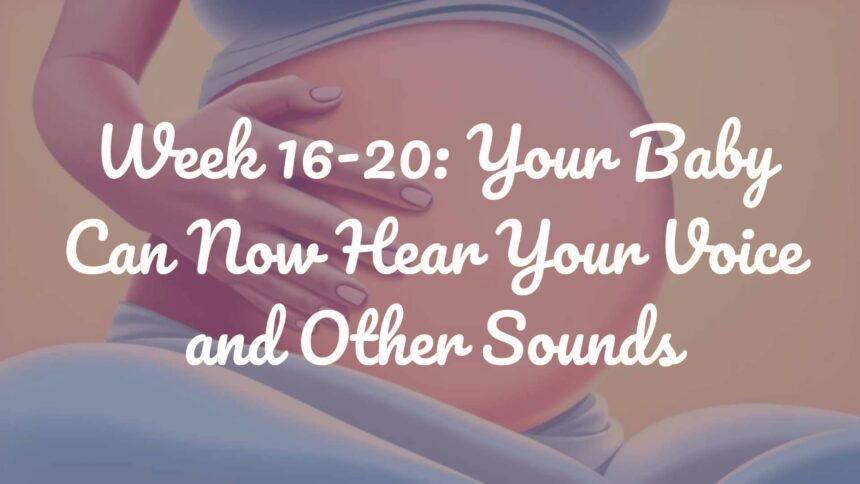During weeks 16-20 of pregnancy, your baby starts to hear your voice and other noises! This stage marks an exciting step as your baby’s hearing system becomes developed enough to notice both sounds inside your body and some coming from the outside. Although everything is still muffled, these first sound experiences are very important for your baby’s brain and for building a close bond with you before birth.

How Your Baby’s Hearing Develops in Weeks 16-20
Your baby’s sense of hearing is built little by little while still in the womb. It may seem like your baby suddenly starts to hear at this stage, but the process began much earlier. These early steps prepare your baby for the sounds they can start hearing by the second trimester.
How Does the Ear Form?
- 5 weeks: Ear development begins as two small spots on your baby’s head. These marks turn into the inner ears.
- Soon after: The spots fold in, making sacs right under the skin. These lengthen into tubes, with the cochlea-your baby’s main hearing organ-forming a spiral at the end.
- 8 weeks: Ear bones begin to develop from small clusters of tissue, getting harder over the next several weeks. A cavity forms that becomes the middle ear.
- 12 weeks: Tiny hair cells grow inside the cochlea. These cells send sound signals to the brain. By 16 weeks, the path between ear and brain is ready, so your baby can begin to process sounds.

Changes in Baby’s Hearing (Weeks 16-20)
Between these weeks, your baby’s hearing matures quickly. The ear, middle ear, and outer ear shapes finish forming around week 7, but it takes longer before they work fully. By 16 weeks, signals from the ear can reach the brain. At 18 weeks, your baby’s ears move into place on the head, and the baby may start to hear. By the 20th week, the ears are nearly set and your baby’s hearing keeps improving. Over this period, connections between ear cells and the brain get stronger, letting your baby start to notice more of the world through sound.
| Week | Developmental Milestone |
|---|---|
| 5 | Ear spots form; start of inner ear |
| 8 | Ear bones begin developing |
| 12 | Hair cells appear in cochlea |
| 16 | Ear-brain connection complete |
| 18-20 | Ears nearly final position; start to hear sounds |
When Does Your Baby Start to Hear You?
As your pregnancy continues, your baby’s hearing plays a big part in getting ready for life in the outside world and in building your first connection. Many parents wonder when their little one can actually start hearing.
What Sounds Can Your Baby Hear in the Womb?
From about 16 to 22 weeks, your baby hears soft noises from inside your body. These might include:
- Your heartbeat’s steady rhythm
- The soft sound of your breathing
- The gurgles from digestion

Can Babies Recognize Voices?
Yes. Studies show babies learn their mother’s voice while still inside the womb, and they can even show signs of recognizing it, like changes in heartbeat. By about 20 weeks, they may also begin to notice voices they hear often, like a partner, or siblings. So, people who talk, read, or sing to your bump can start building a connection with the baby even before birth.
Babies can also get used to songs or sounds repeated often during pregnancy. After birth, they may find these noises comforting. While playing classical music doesn’t make babies smarter, listening to any music, talking, and reading can help your baby’s hearing, memory, and emotional growth. This is a simple, loving way to introduce them to sound.
What Does the World Sound Like to Your Baby?
Being inside the womb is like sitting underwater with a steady background hum-all sounds are muted. It is not silent in there, though. The womb is full of sound, just filtered in a way that changes how your baby hears it.
How Are Sounds Muffled Before Reaching Your Baby?
- All outside sounds have to move through several layers: your skin, the uterus wall, and the amniotic fluid.
- This natural padding cuts outside noise in half, so even loud noises become softer.
- Voices and music sound muted; your baby can hear tone and rhythm, but words aren’t clear.
How Loud Are Sounds for Your Baby?
Inside the womb, your body’s noises are quite loud for the baby-sometimes as much as a running washing machine. These constant sounds feel familiar and safe. For outside noises, only very loud ones will stand out. Sharp noises, like a dog barking or car horn, are easier to notice. Still, all sound is softened by the tissues and fluid, which helps keep your baby’s developing ears safe from damage.

Does Playing Music or Talking to Your Belly Make a Difference?
Many parents wonder if talking or playing music to the baby affects their growth. While some myths claim playing certain music can make your baby smarter, science doesn’t really back that up. But interacting with your baby before birth is still valuable.
Should You Play Music or Talk to Your Baby?
- No proof says playing Mozart or other classical music increases IQ, but it’s not harmful to listen to music of any style you enjoy, as long as it’s not too loud.
- Don’t put headphones right on your belly-doing this can make the sound too strong for your baby and could even hurt their hearing.
- Talking and reading to your baby is encouraged. Just speak naturally and often, about anything-your baby knows and likes your voice best. Partners and siblings can talk to your belly, too, helping your baby recognize family voices earlier.
What Are the Benefits of Communicating with Your Baby?
- Helps with the baby’s brain and hearing growth-hearing your voice and familiar tunes is good practice for life outside the womb.
- Scotties bonds: Your baby feels safer and more at ease when they recognize your voice. Songs or books you repeat can calm them even after birth.
- Other family members can also grow a bond with the baby before they arrive by chatting, reading, or singing to the bump.

Should You Stay Away from Loud Noise During Pregnancy?
It’s normal to wonder if loud noises can harm your baby once their hearing develops. The layers surrounding your baby soften even strong noises, but it’s still smart to be careful if you’re often around loud sounds.
What Noise Levels Are Safe?
- Everyday loud sounds are usually fine-the womb quiets them down. Going to the occasional concert or event shouldn’t cause problems (it’s best not to stay right by speakers).
- Exposure to very loud noises, above 115 decibels (like a chainsaw), should be avoided, especially for long periods.
- It’s smart not to spend eight hours straight in noise over 85-90 decibels or over two hours a day above 100 decibels. If you work with heavy machines or in very loud places, see if you can work somewhere quieter while pregnant, since noise can still travel through your body even if you wear ear protection.
Can Loud Sounds Harm Your Baby’s Hearing?
A few noisy moments aren’t likely to cause trouble. But being around loud sounds daily for a long time could hurt your baby’s hearing, especially during the last months of pregnancy. Never use headphones on your belly. This can send very strong vibrations right to your baby’s ears, risking damage. Being careful about noise is a good way to keep your baby’s hearing healthy.
How to Support Your Baby’s Hearing at 16-20 Weeks
As your baby starts to hear better, there are simple things you can do each day to help their growth and feel closer to them.
How You Can Help Your Baby’s Hearing
- Talk to your baby about anything, any time.
- Read stories or magazines out loud.
- Ask your partner or family to chat or sing to your belly.
- Singing, playing gentle music, or humming familiar songs can calm and comfort your baby, both before and after birth.
- Relax, think about your baby, and pay attention to their movements. Gently rubbing your belly or responding to kicks shows your baby you’re nearby, which helps you feel even more connected.
What to Avoid for Healthy Hearing Development
- Medicine: Some medications, like certain antibiotics, can cause hearing loss. Tell all your doctors you’re pregnant, and only take medicine that your healthcare provider says is fine.
- Fish: Fish is good for your baby’s brain, but only eat kinds low in mercury-like salmon, shrimp, cod, and tilapia. Stay away from high-mercury fish, including swordfish, shark, king mackerel, and tilefish.
- Alcohol: Drinking while pregnant can cause lifelong problems, including trouble with hearing. There’s no safe amount-avoid alcohol completely until after your baby is born.
By talking, singing, and being cautious with noise, medicine, certain fish, and alcohol, you can help your baby’s hearing develop well and give them a great start in life.

